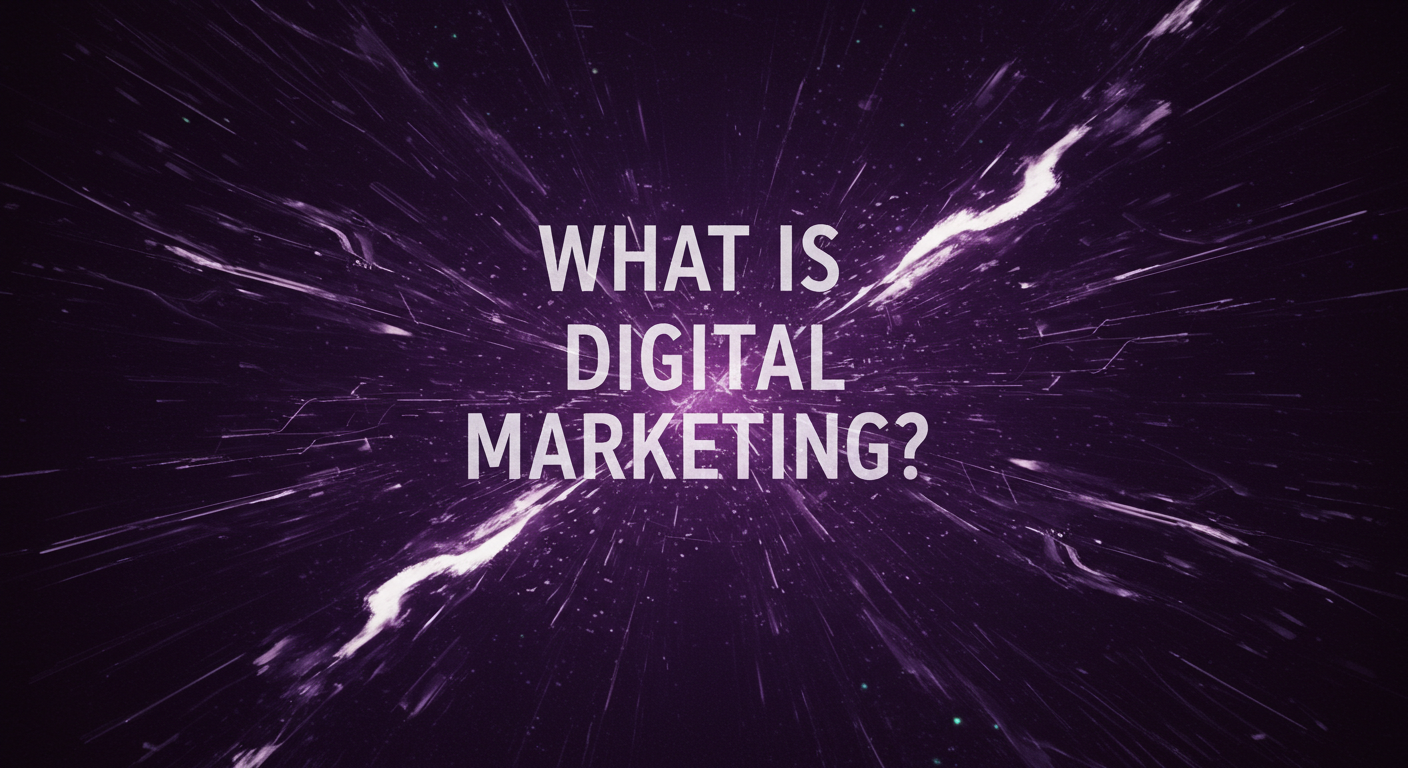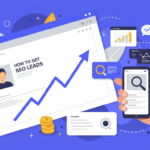
What is Digital Marketing? A Comprehensive Guide to Building Your Online Presence
Digital marketing is the engine that powers modern business growth. In a world where over 5.3 billion people use the internet daily, connecting with your audience online isn’t just an option—it’s essential. But what exactly is digital marketing, and how can it transform your business? At Tom Wilson Digital, we’re breaking down the fundamentals, benefits, and actionable strategies to help you master this dynamic field.
What is Digital Marketing? Defining the Digital Landscape
Digital marketing encompasses all strategies and tactics used to promote brands, products, or services through digital channels. Unlike traditional marketing (think billboards, TV ads, or flyers), digital marketing leverages the internet and electronic devices like smartphones, tablets, and computers. It’s a vast, interconnected ecosystem that includes everything from social media posts and Google Ads to email campaigns and blog articles.
The core advantage? Precision. Digital marketing allows businesses to target specific audiences, track results in real time, and adjust strategies on the fly. Whether you’re a startup or an established enterprise, it offers flexibility, scalability, and measurable outcomes.
Key Components of Digital Marketing: Breaking Down the Essentials
Digital marketing isn’t a single tactic—it’s a blend of interconnected strategies. Let’s explore the most critical components and how they work together:
1. Search Engine Optimisation (SEO)
SEO is the art and science of improving your website’s visibility on search engines like Google. It involves optimising content, technical elements, and backlinks to rank higher for relevant keywords. For example, a coffee shop in Manchester might target phrases like “best flat white near me” to attract local customers.
- On-Page SEO: Optimising meta tags, headers, and content for keywords.
- Off-Page SEO: Building authority through backlinks and social signals.
- Technical SEO: Improving site speed, mobile responsiveness, and crawlability.
SEO is a long-term strategy, but its organic reach delivers sustainable results. For a deeper dive, explore our guide on what is SEO.
2. Pay-Per-Click Advertising (PPC)
PPC is the “fast lane” of digital marketing. You pay each time someone clicks on your ad, making it ideal for immediate visibility. Platforms like Google Ads and Microsoft Advertising let you bid on keywords, while social media platforms like Facebook and Instagram offer hyper-targeted ad placements.
| PPC Platform | Best For |
|---|---|
| Google Ads | High-intent searches (e.g., “buy running shoes online”) |
| Facebook Ads | Brand awareness and demographic targeting |
| LinkedIn Ads | B2B lead generation |
Curious about managing PPC campaigns? Our post on how to do PPC walks you through the process.
3. Social Media Marketing
Social media isn’t just for memes and cat videos. Platforms like Instagram, TikTok, and LinkedIn are powerful tools for building relationships, showcasing your brand’s personality, and driving sales.
- Organic Social Media: Regular posts, stories, and engagement to grow your community.
- Paid Social Advertising: Sponsored posts to reach new audiences.
- Influencer Partnerships: Collaborating with trusted voices in your niche.
For example, a skincare brand might use Instagram Reels to demonstrate product benefits or partner with micro-influencers for authentic reviews.
4. Content Marketing
Content marketing revolves around creating value-driven content that educates, entertains, or inspires your audience. This includes:
- Blog posts (like this one!)
- Videos and podcasts
- Infographics and e-books
- Case studies and whitepapers
The goal? To build trust and position your brand as a go-to resource. For instance, a financial consultancy might publish articles on “How to Save for Retirement in 2024” to attract potential clients.
5. Email Marketing
Email marketing is one of the most cost-effective channels, offering an average ROI of £36 for every £1 spent. It’s perfect for nurturing leads, promoting offers, and retaining customers. Key tactics include:
- Welcome sequences for new subscribers
- Abandoned cart reminders
- Seasonal promotions
Learn how to craft compelling emails with our guide on how to write a marketing email.
6. Conversion Rate Optimisation (CRO)
CRO focuses on turning website visitors into customers. This involves A/B testing elements like headlines, images, and call-to-action buttons to improve user experience and boost conversions. For example, simplifying your checkout process could reduce cart abandonment rates by 20% or more.
Why is Digital Marketing Important? The Unbeatable Advantages
Digital marketing isn’t just a trend—it’s a necessity for businesses that want to thrive in the digital age. Here’s why it’s indispensable:
1. Reach the Right Audience, Anytime, Anywhere
Traditional marketing casts a wide net, but digital marketing lets you target specific demographics, locations, and even behaviours. A fitness app, for instance, can target ads to users aged 18–35 who follow health influencers on Instagram.
2. Cost-Effective and Scalable
Small businesses often struggle with tight budgets, but digital marketing levels the playing field. A well-optimised Google Ads campaign can cost as little as £1–£2 per click, while a local SEO strategy can generate free organic traffic over time.
3. Real-Time Data and Analytics
With tools like Google Analytics and Facebook Insights, you can track exactly how your campaigns perform. See which posts drive engagement, which ads convert, and which pages need improvement—all in real time.
4. Personalisation at Scale
Modern consumers expect tailored experiences. Digital marketing tools let you segment audiences and deliver personalised messages. For example, an e-commerce site can send product recommendations based on a customer’s browsing history.
5. Builds Long-Term Brand Loyalty
Consistent, valuable content fosters trust. A bakery that shares recipes, behind-the-scenes videos, and customer testimonials becomes more than a business—it becomes a trusted part of its community.
How to Build a Winning Digital Marketing Strategy: A Step-by-Step Plan
Ready to dive in? Follow this roadmap to create a strategy that delivers results:
1. Define Clear, Measurable Goals
Start by asking: What do you want to achieve? Common goals include:
- Increasing website traffic by 30% in six months
- Generating 50 new leads per month
- Boosting online sales by 20% year-over-year
Use the SMART framework (Specific, Measurable, Achievable, Relevant, Time-bound) to refine your objectives.
2. Understand Your Audience Inside Out
Create detailed buyer personas to guide your messaging. Consider:
- Demographics (age, gender, location)
- Pain points (e.g., “struggling to rank on Google”)
- Preferred channels (Do they scroll Instagram or listen to podcasts?)
Tools like Google Analytics and social media insights can uncover valuable data about your audience.
3. Audit Your Current Digital Presence
Before launching new campaigns, assess what’s already working (or not).
- Website: Is it mobile-friendly? Fast-loading?
- SEO: Are you ranking for relevant keywords?
- Social Media: Which platforms drive the most engagement?
Our free SEO audit tool can help identify gaps in your strategy.
4. Choose the Right Mix of Channels
Not all channels will suit your business. For example:
- B2B companies often thrive on LinkedIn and email marketing.
- E-commerce brands benefit from Instagram Shopping and Google Ads.
Focus on 2–3 channels initially to avoid spreading resources too thin.
5. Create High-Quality Content
Content is the fuel for digital marketing. Prioritise:
- SEO-Driven Blogs: Answer common questions in your industry.
- Video Content: Tutorials, testimonials, or product demos.
- Email Newsletters: Share updates, tips, and exclusive offers.
For inspiration, read our tips on small business content marketing strategies.
6. Test, Measure, and Optimise
Digital marketing is iterative. Regularly review metrics like click-through rates, conversion rates, and bounce rates. Use A/B testing to refine ads, emails, and landing pages.
Common Digital Marketing Myths—Debunked!
Let’s tackle misconceptions that hold businesses back:
Myth 1: “Digital marketing is too expensive for small businesses.”
Reality: Tactics like SEO and organic social media can deliver results on a shoestring budget.
Myth 2: “You need to be on every social platform.”
Reality: Focus on platforms where your audience spends time. A B2B law firm doesn’t need TikTok.
Myth 3: “SEO is dead.”
Reality: SEO evolves but remains critical. Voice search and AI are shaping its future.
The Future of Digital Marketing: Staying Ahead of the Curve
While this guide focuses on fundamentals, the digital landscape never stands still. Emerging trends like AI-driven content, voice search optimisation, and augmented reality (AR) shopping experiences are redefining what’s possible. Staying adaptable and informed will ensure your strategy remains effective for years to come.
Final Thoughts: Your Digital Marketing Journey Starts Here
Digital marketing is more than a toolkit—it’s a mindset. By understanding your audience, leveraging the right channels, and continuously refining your approach, you can build a thriving online presence that drives growth and fosters loyalty.
At Tom Wilson Digital, we specialise in crafting tailored strategies that align with your unique goals. Whether you’re exploring SEO services or need help with conversion rate optimisation, we’re here to guide you.
For more insights, dive into our posts on why digital marketing is important or how to design a website that converts.
FAQs
SEO, PPC, social media, and email marketing are among the most effective channels. However, the best channels depend on your business and audience.
Absolutely! Digital marketing offers cost-effective ways for small businesses to compete with larger companies.
The cost varies depending on the strategies you choose. You can start small with a limited budget and scale up as you see results.
This depends on the tactics used. SEO may take months, while PPC can show immediate results. Patience and persistence are key.
While it’s possible to manage digital marketing on your own, hiring an expert can save time and ensure you’re using the best strategies for your business.









